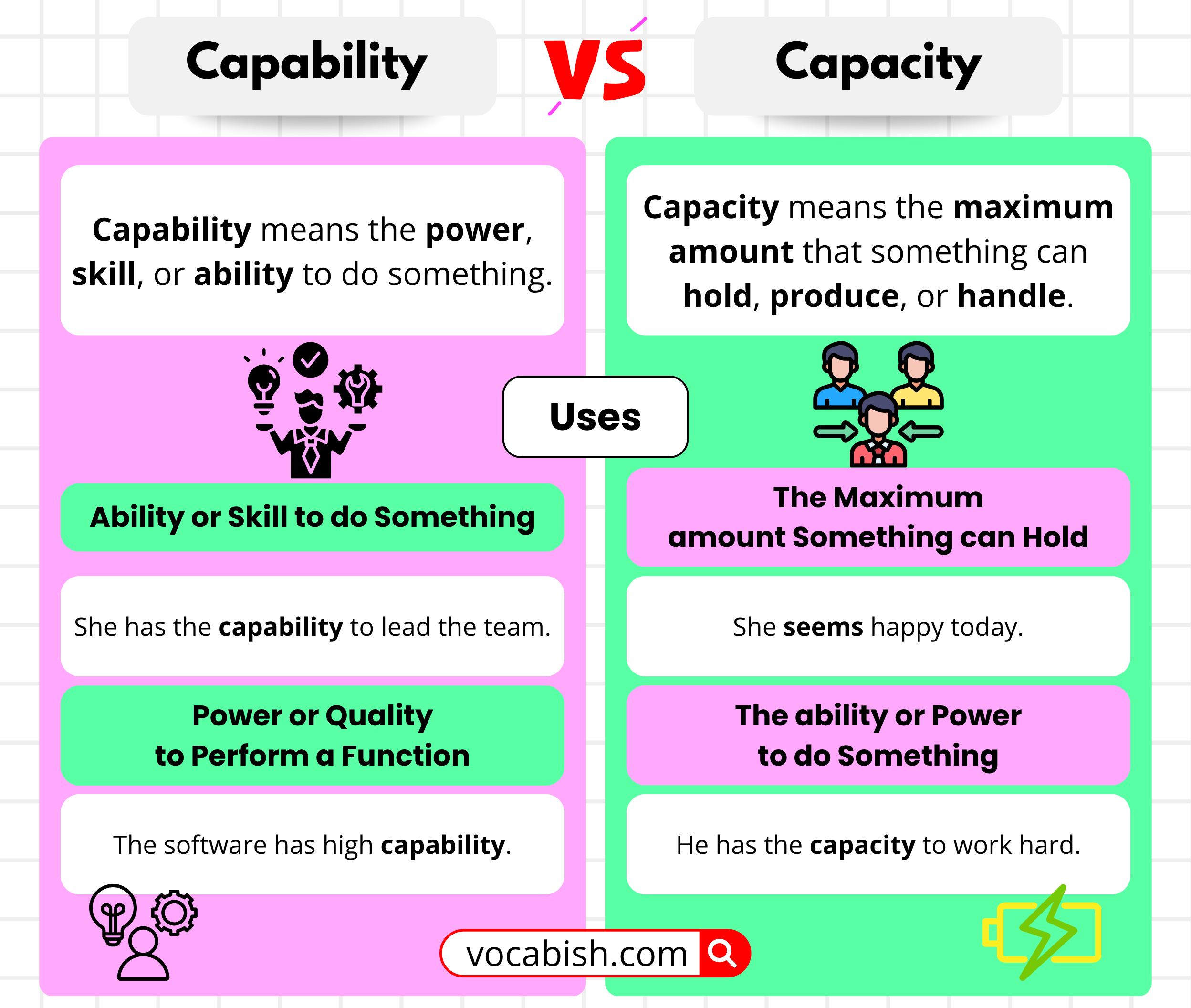Many English learners find it confusing to understand the difference between capability and capacity. Both words are related to ability or power, but they are used in different situations. This short and simple guide will help you learn what each word means and how to use them correctly in daily English.
You can explore our 100 confusing words list to expand your vocabulary skills!
Meanings of Capability and Capacity
Capability
The word capability means the power, skill, or ability to do something. It shows what someone or something can do.
Examples:
- This machine has the capability to print 100 pages in one minute.
- She has the capability to become a great leader.
In short: Capability = skill or power to do something.
Capacity
The word capacity means the maximum amount that something can hold, produce, or handle. It is often used for containers, buildings, or people. It also means mental or physical ability to do something.
Examples:
- The hall has a capacity of 500 people.
- He has the capacity to understand complex ideas.
In short: Capacity = how much can be held or done.
Differences Between Capability and Capacity
| Aspect | Capability | Capacity |
|---|---|---|
| Meaning | Skill or power to do something | Maximum limit or amount |
| Used For | People, machines, or systems | Places, containers, or abilities |
| Focus | What can be done | How much can be done or held |
| Example | She has the capability to teach well. | The tank has a capacity of 100 litres. |
Usage of Capability
1. Ability or skill to do something:
- She has the capability to lead the team.
- This robot has the capability to learn tasks.
2. Power or quality to perform a function:
- The software has high capability.
- The machine’s capability makes work easier.
Usage of Capacity
1. The maximum amount something can hold:
- The hall has a seating capacity of 500.
- The bottle’s capacity is one litre.
2. The ability or power to do something:
- He has the capacity to work hard.
- The student showed great capacity for learning.
Formal and Informal Usage
| Word | Formal Usage | Informal Usage |
|---|---|---|
| Capability | Common in business, education, and technology contexts. | Used when talking about someone’s skills. |
| Capacity | Common in official and technical settings. | Used for talking about space or roles in daily life. |
Example Sentences for Capability
- The robot has the capability to clean the floor.
- He showed his capability in handling pressure.
- The phone has the capability to take clear photos.
- She has the capability to manage a big team.
- The student’s capability improved after practice.
- This engine’s capability is beyond expectation.
- His capability to think fast helped him win.
- The capability of the computer depends on its processor.
- We trust his capability in completing the project.
- They are testing the capability of new software.
- She proved her capability in solving the issue.
- The country has the capability to grow stronger.
- The capability of this tool is amazing.
- You have the capability to achieve your goals.
- The doctor’s capability saved many lives.
- The capability of AI is growing every year.
- The team has shown great capability in teamwork.
- His capability makes him a perfect choice.
- The capability of the system is under review.
- She proved her capability during the training.
Example Sentences with Capacity
- The room’s capacity is 200 seats.
- The tank’s capacity is 100 litres.
- He works in the capacity of a teacher.
- The hospital is working at full capacity.
- This bottle has a capacity of one litre.
- The car engine runs at high capacity.
- She has the capacity to learn quickly.
- The theatre has limited capacity.
- His mental capacity is impressive.
- The school has a capacity for 1,000 students.
- The factory is operating beyond its capacity.
- They used the hall at half capacity.
- He has the capacity for great kindness.
- The dam can store water of huge capacity.
- The computer’s memory capacity is large.
- She served in her capacity as head nurse.
- The capacity of the bus is almost full.
- His brain has the capacity for creative ideas.
- The container has a capacity of five gallons.
- The team is working to increase production capacity.
Summary on Capability and Capacity
- Capability means the skill or power to do something.
- Capacity means the maximum limit or role something can hold or perform.
- Capability = what can be done, while Capacity = how much can be done.
- Both words show ability, but they are used in different situations.
FAQs on Capacity vs Capability
What is the difference between capability and capacity?
Capability shows ability or skill, while capacity shows limit or size.
Can capability and capacity be used interchangeably?
No. Capability is about doing, and capacity is about holding or handling.
What is an example of capability?
Example: She has the capability to design beautiful websites.
What is an example of capacity?
Example: The hall has a capacity of 800 guests.
How do we remember the difference?
Think: Capability = skill; Capacity = limit.
Read More

